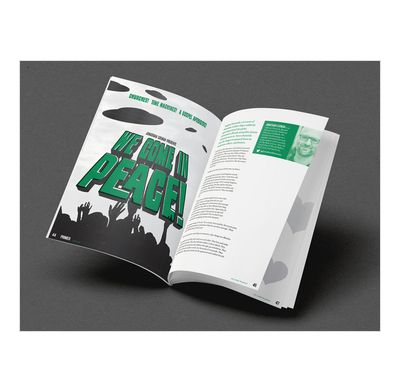Primer: Show & Tell – A Review

Introducing Primer

If you’ve not come across the Primer resources before, they’re brilliant! For a fuller introduction, check out my interview with founder and editor, David Shaw. The rich combination of pastoral articles, interviews, theological studies and some guided reading from church history – but all focused on one particular issue or doctrine in each edition – means you get a ‘deep dive’ and a brilliant catalyst for help your church leadership reflect together on putting theology into practice.
As Shaw has said, “we want you to turn off the devices, put on the kettle, draw others round, and see the difference theology makes to the life of the church. It’s designed to be enjoyed, scribbled over and wrestled with.” Aesthetically, Primer’s also an absolute delight to engage with, thanks to the creative talents of Jonathan Bennett. There’s space to make notes, questions to aid discussion, and just having it on paper means our digitally-trained brains are forced to slow down and process.
Show & Tell
Doing a bit of teaching on apologetics this year with CCL, I was thrilled when I discovered that the latest Primer is on that very theme: ‘Show & Tell: The Meaning & Role of Apologetics‘. For a topic that can often be akin to marmite amongst Bible-believing evangelicals (to caricature: “Don’t bother with apologetics, just teach the Bible…” or “We’re not meant to argue people into the kingdom”), this is a really helpful digest of careful theology and praxis.
Dan Strange (Oak Hill College) has spent years teaching and writing on apologetics and its interface with cultural exegesis, a theology of religions and public theology (indeed his forthcoming book, Plugged In, is much-anticipated). He provides the opening essay and tackles the idea that apologetics is something of a ‘dark art’. It’s a helpful introduction to the different models of apologetics, highlighting the theological differences ‘under the bonnet’ in such approaches. Strange is particularly making the case that a ‘presuppositional’ approach best reflects the Bible’s account of humanity. In essence, humans are not neutral beings who can impartially evaluate evidence, and so rather than simply present ‘proofs’ of Christianity, we instead need to operate at the level of presuppositions. This means confronting people at the level of their underlying convictions, because it’s through these convictions that each of us views the world. And so we highlight both the ‘unworkability’ of a non-Christian perspective and we appeal to the truth, beauty and goodness of the Christian worldview, which in some fragmented way they are already likely to recognise in part.
Along the way Strange engages with some of his critics, both acknowledging that sometimes presuppositionalists haven’t necessarily presented the method in the most compelling light, and noting the impact of the likes of Tim Keller and Ted Turnau in ensuring we’re engaging at the level of the heart and the imagination, as well as dealing in the economy of hope. Given that the general knee-jerk view of apologetics is simply ‘answering the world’s hard questions’, it is quite a paradigm shift to hear that, actually, when done well, apologetics is more akin to ‘asking hard questions of the world’. As Joel Garver has put it,
“the goal of apologetics, then, is not to win an argument, but to commend the Saviour as the one in whom human life, personal relationships, and knowledge can find rest.”

Exposing Soup Posing As Steak
With that essay providing much to chew over, Matt Peckham does church leaders a great service by digesting and commenting on four recent books on apologetics and cultural engagement, including the hugely engaging Popologetics by the aforementioned Turnau and a recent offering from William Edgar. Peckham then makes some sharp observations, decorated with some especially neat little phrases: an unbeliever trying to operate without any Christian presuppositions is like “a fork in a world of soup”; the gospel is “panoramic good news” that speaks to all of life; and in exposing and speaking into one’s affections and hopes, we are communicating on their “heart frequency”. One of the points Peckham establishes is the inevitability of cultural engagement, because all life and culture is ultimately a response to God. This is important not just for how and what we communicate to the world, but also for considering that we’re influenced by the world in more ways than we might expect.
For Primer’s historical section, William Edgar (Westminster Theological Seminary) provides a guided reading of a portion of Blaise Pascal’s (1623-1662) Pensées, which, speaking for myself, I had little appreciation of beyond a few soundbites and a second or third-hand understanding of his infamous ‘Wager’ argument. As Edgar shows, Pascal has much to say to a culture that often exerts that human reason is all sufficient. I think these guided readings are one of Primer’s real strengths, giving one confidence in turning to ‘old texts’. Edgar’s commentary exemplifies this; in particular he does a brilliant job of showing how Pascal’s ‘Wager’ is much less “a cold business calculation,” as it is “an impassioned plea for a soulful decision”.
More Than Just An Occasional Topical Talk
Next up is Jonathan Leeman (Editorial Director, 9Marks) on the place of the church community in apologetics. This is a challenging article and an urgent call to not over-look the gospel being “church-shaped”. His powerful image of the church as a ‘time machine from the future’ (hence Jonathan Bennett’s fabulous artwork below) that displays what Jesus’ rule looks like. For those familiar with 9Marks this won’t necessarily be a surprise, but his practical and far-reaching considerations as to the church’s relationship (corporately and individually) with the culture around it give much to think through. This article has also been released as a free downloadable taster to whet your appetite for Primer.
Gavin McGrath takes us back to a broader reflection on the purpose of Scripture. Rather than imagining a clear division between ‘normal preaching’ and ‘apologetic preaching’, if we’ve understood that the Bible is a hugely subversive piece of communication then this should lead to preaching that he describes as ‘thick apologetics’:
“It questions all of the promises and interpretations of contemporary ideas, theories, values and conceptions offered by the cultural voice and persuades. It is not simply a proclamation of theological truths… God’s own speaking deconstructs [the listener’s] flawed worldview and erroneous presuppositions and, thereby, shows them the incompleteness of their living.”
In many ways this is representative of the the wide-angle view of apologetics that this edition of Primer seeks to establish. It reminded me of a long-form piece by Sarah Eekhoff Zylstra from the back end of last year. As one of the people she spoke to, Collin Hansen, put it,
“[Apologetics] is not about merely defeating non-Christians in an argument. It’s about showing them the beauty of the gospel. ‘Doesn’t this make more sense?’ ‘Isn’t this more hopeful?’ ‘Isn’t this more plausible?’”
The final section of Primer embodies this approach in real ministry situations. A collection of church leaders from areas of varying demography are interviewed about the major apologetic challenges that they encounter, and explain how as a church they’ve sought to address these issues in evangelism and discipleship. I always found it hugely stimulating to hear others talk through their ministry practice, unpacking the thinking and cultural observation that has gone on ‘under the bonnet’ to shape this. Two further interviews are freely available on the Primer HQ site as an Appendix for download.
The Ministry Team’s Friend
I sense that most of are aware of how different the general culture of the UK feels compared to even, say, 5 years ago. And many of us instinctively feel that these changes should be shaping our ministries in some way. Yet we also want to be faithful heralds of the gospel and not simply pander to the needs, desires and idols of our culture. We know the gospel doesn’t change, and so we feel we face a supposed quandary.
This is where this edition of Primer is the Ministry Team’s Friend. This is a taster of a wide-angle view of apologetics, showing it to be inseparable from gospel proclamation, inseparable from faithful reading of the Scriptures, inseparable from understanding humanity and the culture around us. And so if you’re currently wary of apologetics because it seems too academic, too compromised, or too artificial, then Primer: Show & Tell will be a re-assuring and challenging read. Re-asssuring because the various authors are suggesting apologetics need not be any of those things. But challenging because it then invites us to re-think our ministries and to engage as the authors would suggest. Thankfully the applied format, complete with discussion questions for each piece, make it the perfect tool to begin that conversation.

Pick up a copy of Primer for you and your leadership team here.
Disclaimer: I received a free review copy of this resource from the editor, but I hope this is still a fair and honest review.